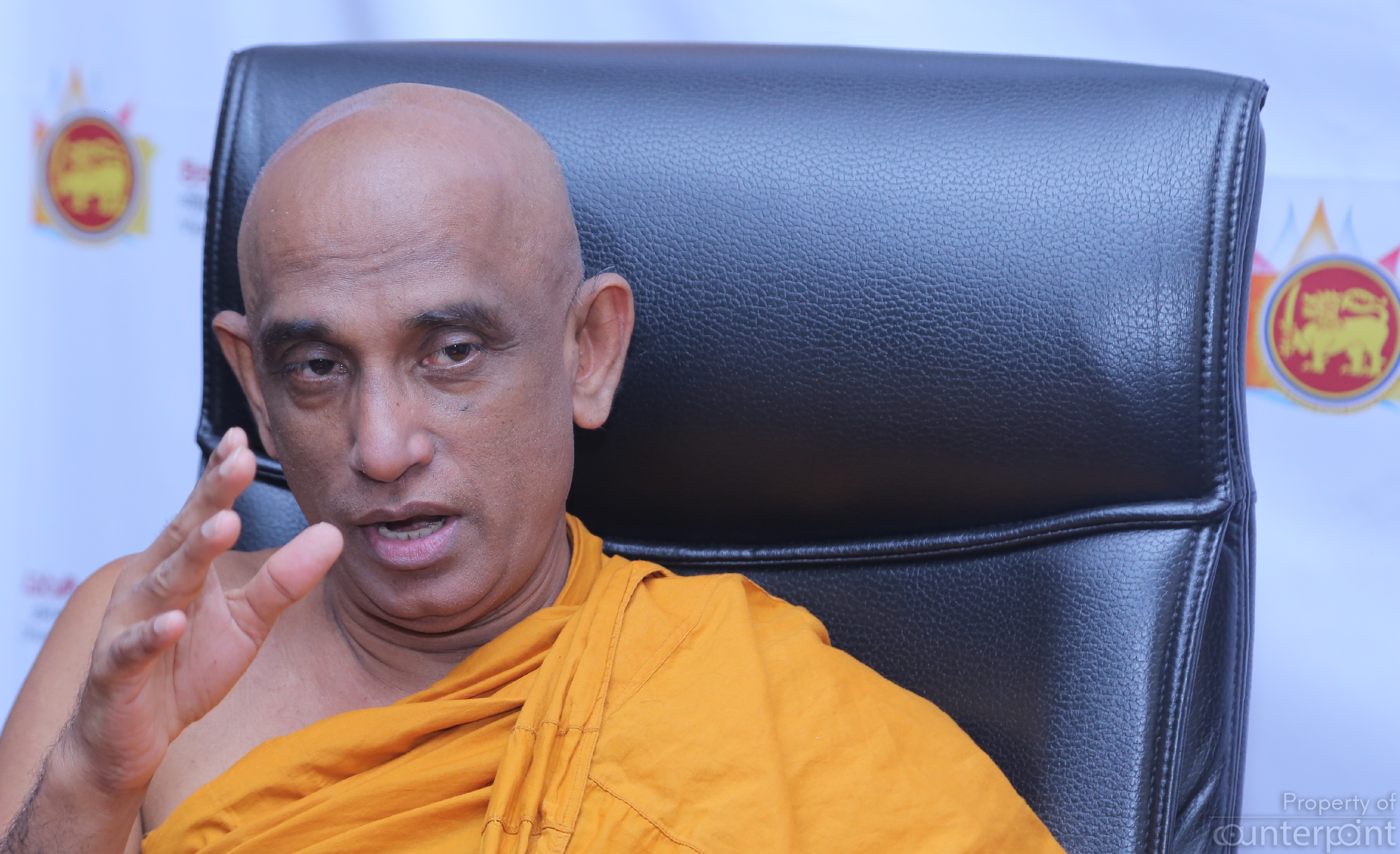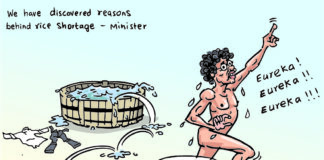Q: There has been a growing opposition to the members of Maha Sangha taking to active politics and entering Parliament and other political institutions. How would you justify Buddhist monks entering Parliament, which should be kept secular?
A: A Bhikkhu, with awareness of political issues and ability to deal with them is an asset in politics. Such a knowledgeable Bhikkhu has the potential to make a real difference in politics. As a journalist you should be asking whether there has been a correct assessment of the contribution made by the Bhikkhus in active politics. Today, there is no single surviving political ideology; there is a mixed bag of ideologies. The two main political parties consist of rouges. They do not have internal discussions to educate their members on national issues. Those are just political parties full of rogues. They cannot steer the nation out of the current crisis. For that task, we need a progressive political force comprising educated persons with a vision. The Bhikkhus, therefore, have a pivotal role to play in active politics at present. They should come forward to fill the vacuum because they have education, knowledge, love for the people and the country and necessary vision to serve the nation. They should be encouraged to take part in active politics for the sake of the nation. They could lead our nation to prosperity.
Q: But the Mahanayakes of the Three Nikayas have stressed that the Bhikkhus should not take to active politics. They have requested all political parties not to give nominations to the members of the Maha Sangha to contest the upcoming general elections or accommodate them in Parliament via the National List. Can you reconcile your position with that of the Buddhist prelates?
A: Though the Mahanayakes have expressed such an opinion there are other practical issues that we should take cognizance of. Among the Sangha, there is no unanimity. There are 30 main Nikayas and they don’t adopt a consensual approach to any issue. They express divergent issues thereon. For example, with regard to the coal-fired power plants, Malcolm Cardinal Ranjith made a statement, clearly outlining the position of the Catholic Church on the issue. The prelates of four main chapters should have done likewise. They could have issued a common statement. If there is a mechanism to get the four main chapters together on a common platform and speak with one voice, there won’t be any need for Bhikkhus to engage in active politics or enter Parliament.
Q: You started your politics from the JVP. Thereafter, you were a member of the Janatha Mithuro. You leaned towards nationalistic politics and were in National Movement against Terrorism, Sihala Urumaya and then the Jathika Hela Urumaya. Towards the final stage of war you were with the Mahinda Rajapaksa government. Later on, you switched your alliance Maithripala Sirisena’s camp. You were then seen to be promoting the SLPP presidential candidate. A couple days ago you made a statement against Mahinda Rajapaksa, calling upon the latter to retire from politics. You don’t seem to have a firm stand. Where would you locate yourself on the political spectrum?
A: It is a good question because I can clarify many wrong opinions about me. I was in students politics. I was against the Indo-Lanka Peace Accord. I had an understanding of JVP politics. I have never been a JVP member. I did not support them. I only shared some of their progressive ideas. Thereafter, I joined the Janatha Mithuro movement and worked with the likes of Champika Ranawaka and Malinda Seneviratne. I was in that movement till 2015. I was thinking, planning and working for a new political movement against the UNP, and experimented with many alternative forces to achieve that goal. One of our main concerns is the environment, which is being destroyed. The world is facing many environmental problems which have the potential to annihilate mankind. Though the environment issues came to world political stage, in 1997, following the Kyoto Protocol, here in Sri Lanka it has not been the case. Threats to environment have now been identified as a crucial issue since 2015 Paris Conference and 2020 Climate Change conference.
What has been happening in the world has proved us right. I left Champika and others, in 2016, when they decided to join the UNP. In August 2015, I tried to unite the Maithree and Mahinda factions of the SLFP. If my effort had reached fruition, we would have easily won the 2015 general election. Mahinda Rajapaksa should have accepted the fact that Maithripala Sirisena was the President; if he had consented to work with Sirisena, at that time, the political history of this country would have been different, today. What I wanted was to make Gotabaya Rajapaksa the Prime Minister under Maithripala Sirisena. If we had been able to do so we would have been able to win at least 105 seats in 225 member Parliament easily. But we could get only about 90 seats though the UNP was not so popular. The main reason for the loss was the disunity in the anti-UNP camp. We hoped to strengthen democracy with the help of the new government, at that time. It was a strategic move, which unfortunately failed. We soon realized that it was a rogue-government. It colluded with some members of the international community to bring about a UNHRC resolution against our war heroes. They got stealing public funds down to a fine art. There has been no fraud bigger than the Treasury bond scams, in this country. I decided to leave that government. Many who were in the Mahinda Rajapaksa camp joined forces with President Sirisena, who alone could stand up to the UNP. I continuously uphold a single ideology, which has not changed. My plan was to form a party to uphold that ideology and secure at least 20-30 seats in Parliament so that we could act as the balance of forces.
Q: How are you going to get 20-30 seats? Aren’t you aiming too high?
A: Our party will unite those who are disillusioned with the main parties and the present state of affairs in politics. These people have similar values and it is easy to rally them because they are like-minded. There are some loose ends and we will be able to sort out those issues before long. We can get that number of seats if we conduct a good campaign. People detest dirty politics.
Q: There are reports that you bought off the Ape Jana Bala Party from its General Secretary Welisarage Saman Prasanna Perera for Rs. 40,000,000 rupees. What would you say to this?
A: That is not true. Saman Perera agreed to hand over the party to us as he agrees with our policies.
Q: Wasn’t it the demise of Ven. Soma Thera that enabled the Buddhist monks to enter Parliament?
A: No, that is not so. There were Bhikkhus in active politics before that. Ven Baddegama Samitha Thera was in politics. He is contesting the forthcoming election on the SLPP ticket.
Q: Soma Thera set in motion a political force, which helped several Buddhist monks to enter Parliament. One of the much-avowed objectives of the MP monks was to rid politics of thugs. There are serious allegations against the person who owns the party you represent. Don’t you think you find yourself in a contradiction?
A: We have no such information about that person. We needed a registered political party. We discussed with around 10-12 persons who had parties under their names. It is with Saman Perera that we could reach an agreement.
Q: Will you use the same name and the symbol at the upcoming election?
A: Yes.
Q: There are reports that Tamil politicians such as V Ananadasangaree and military veterans such as Maj Gen Jagath Dias are in your party. Are they also contesting?
A: Yes, they all are there. Hindu priests, too, will be contesting from our party. We have Hindu-Buddhist Parshad. We would be contesting as a joint alliance.
Q: What happened to the campaign called ‘A Toxin Free Nation’ you launched several years back? Where is it now?
A: In the years 2016 and 2017, we had state support for that campaign and it was very successful. Some projects were not so successful because the country was hit by a protracted drought. Overall, the results have been very impressive. We have introduced methods which do not rely on toxic fertilizers and chemicals such as pesticides. For example, chemical fertilizer was used to produce 8,000-10,000 kilos of potatoes in Nuwara Eliya, in the past. But, now, we produce double that amount without using any toxic fertilizer. We got a yield of 20,000 kilos of potatoes by using that method even in the Trincomalee District. The same could be applied to paddy and coconut, vegetables and fruits. We can use these methods to produce twice the amount the country needs, in three years. I have pointed this out to President Gotabaya Rajapaksa and he has given his consent for it. So, we will be able to rid the country of toxic fertilizer through that campaign.
Q: You were a leader in student unions during your university days. Would you like to comment on the current situation prevailing in student politics in universities?
A: It is so sad to comment on the present situation. Now there is no academic discussion or debate in universities. Ragging was there then, but there no brutal incidents like the ones being reported these days. I have noticed it is the students with inferiority complex who are responsible for ragging. Those who come with disturbed family backgrounds and those who are without any talents to outshine others make use of ragging to boost their egos. This is a menace that should be removed from our universities. I wonder why the media do not conduct a campaign against ragging.
Q: What are the salient points of your manifesto?
A: At the Paris conference, we agreed to work towards achieving 17 goals to ensure a better environment. As a result the world’s developed nations are moving away from coal power. But, here, in Sri Lanka, we are increasing the production of coal-fired power. We have to import coal at a tremendous cost. In his election manifesto and policy statement in Parliament, President Gotabaya Rajapaksa stated that we would promote renewable sources of energy. But recently, a minister has submitted a Cabinet paper for the construction of another coal power plant for 300 MW. When I questioned it, I was asked whether I had any alternative solution to help overcome the energy crisis within the next three years. My answer was that we should find solutions for the energy problem during those three years in a sustainable manner. We are a tropical country and we could and should tap solar energy.
We are also planning to non-toxic agriculture.
We are keen to conserve the existing forest cover by stopping deforestation. The British rulers destroyed the watersheds in the central hill to introduce cash crops in five districts, Ratnapura, Kegalle, Kandy, Matale and Nuwara Eliya. There are over 300,000 acres of tea in those districts besides rubber and coconut. Estates so created have not been successful. During the Ranil Wickremesinghe government some of them were converted into tourist hotels in the central hills. We must reforest those areas, fast.
We have plans to convert Sri Lanka into the world’s best nation in three years. It can be done.





